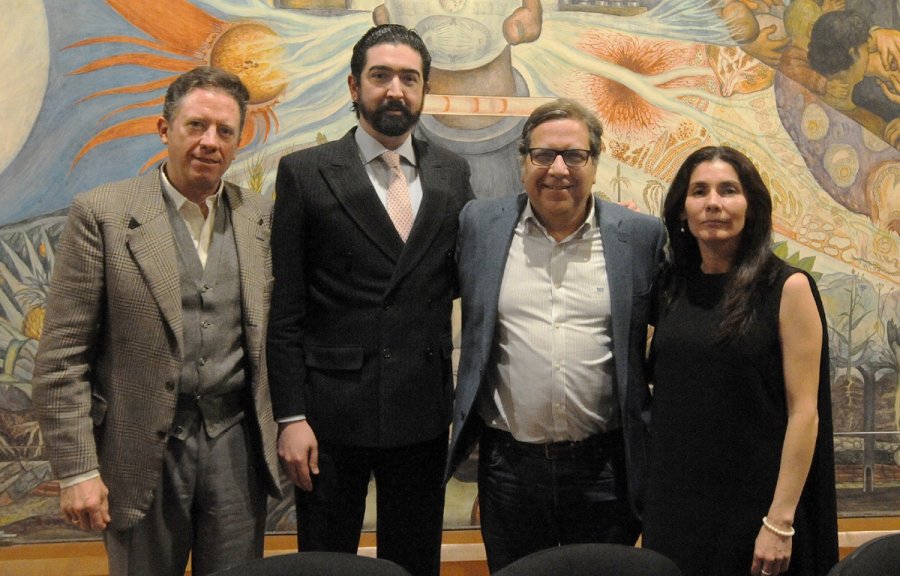Noticias
A new edition of Rafael Tovar y de Teresa´s books: The last toast of Don Porfirio and From peace to oblivion
December 15, 2018As Mexico's great builder of cultural institutions and a passionate about history, so was Rafael Tovar y de Teresa (Mexico City, April 6, 1954 - December 10, 2016) evoked this Friday night, December 14, in the mural area of the Palace of Fine Arts, in the reedition of his books: El último brindis de Don Porfirio (The last toast of Don Porfirio) and De la paz al olvido (From peace to oblivion), published by Penguin Random House.
The Undersecretary of Cultural Development, Edgar San Juan, read the text sent by the Secretary of Culture of the government of Mexico, Alejandra Frausto, in which she expressed the way in which Tovar y de Teresa not only worked for culture and arts, but also made culture his way of life and imagined and created programs with the passion with which he enjoyed concerts, conversations, books, exhibitions or cinema.
"The profile of the cultural promoter owes much to Rafael Tovar y de Teresa who has a special place in my life and in Mexico’s history. He insisted on the value of culture as a factor of social development and added to its spiritual strength the undeniable importance as a generator of harmony and creator of progress”.
In Alejandra Frausto’s words, we recognize in who was the first head of the institution, the human being who brought together in his professional life two fundamental essences, that of creator and that of statesman, who left us pages that are testimony to his way of understanding and explaining Mexico from culture.
Rafael Tovar y López Portillo assured that the reedition of both books gives the opportunity to honor the memory of his father, but also to remember two fundamental works to understand, in the case of the first, the end of an era (The Porfiriato) and, in the case of the second, the end of a life (Porfirio Díaz).
He considered that in addition to public service, history was another of Rafael Tovar y de Teresa’s great passions, reflected in El último brindis de Don Porfirio (The last toast of Don Porfirio), a meticulous chronicle of the centennial celebrations of Independence and the only year of a president who ruled for more than three decades, and De la paz al olvido (From Peace to Oblivion), a book that narrates Porfirio Díaz's last years.
On the other hand, he recalled that Rafael Tovar y de Teresa was the creator of countless programs and institutions that today remain as: the Centro de la Imagen, Canal 22, the Videoteca Cultural, the National System of Musical Promotion, the PAICE, the Trust for the Museum of Popular Art, the National Program of Child Development, Alas y Raíces (Wings and Roots), the digital culture agenda, the National Arts Center, the Fonca, the Culture Program for Harmony and the Department of Culture.
According to researcher Sandra Molina, Rafael Tovar y de Teresa knew how to separate the character from the work in order to place it in its proper context and circumstance and thus, not judge in terms of the twentieth century a man of the nineteenth century.
"He does an exhaustive investigation, reviews documents, archives and unpublished photographs, offers hard data that allow separating the character from the work and does not let this information lead him to personal conjectures to make deep reflections”.
In that sense, historian Carlos Tello brought to mind "the builder of cultural institutions in Mexico that we must value and care for and the man who had the courage to write history as he saw it documented, despite the fact that as a public official it was difficult to have written two books that sympathized with an unpleasant figure in Mexico’s official history.
He pointed out that both publications portray Porfirio Díaz and the country at a specific moment in their history, around 1910, when the regime he headed, the Porfiriato, is on the verge of disappearing.
"Juarez is the national hero par excellence who is today, Díaz, his disciple, collaborator, trusted man, even his friend, and later his adversary. He built the official cult to Juarez in various ways, inaugurated the mausoleum in the pantheon of San Fernando, the first postage stamp he issued in his government had Juarez’s face, celebrated the centennial of Juarez's birth, and inaugurated the Hemicicle to Juarez”.
Pinguin Random House editorial director, Ricardo Cayuela considered that we are dealing with books that have an objective, documentary and precise contribution to the study of the Porfiriato and added that Rafael Tovar y de Teresa "was a prodigy, a meteorite that passed through this country and did us a lot of good”.
Leonora Tovar y López Portillo thanked the Department of Culture for its support as part of the second anniversary of her father's death and recalled some of the conversations with him in which he shared his taste for reading and the importance of having humility, not losing the capacity for astonishment and curiosity, fulfilling one's vocation, persevering and fighting for what one believes in.
Mexico
